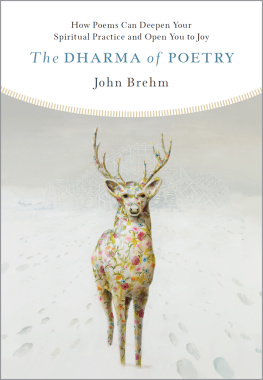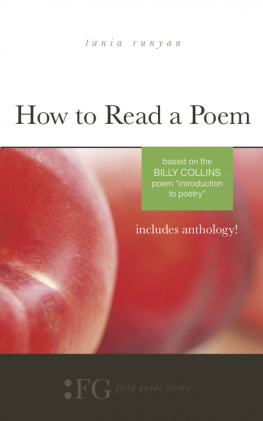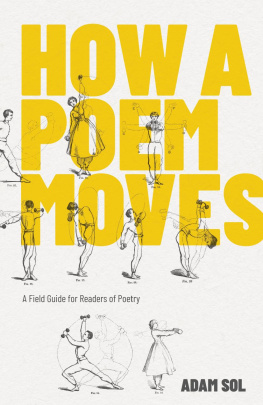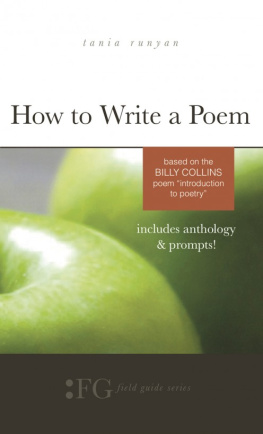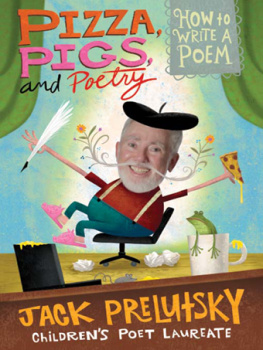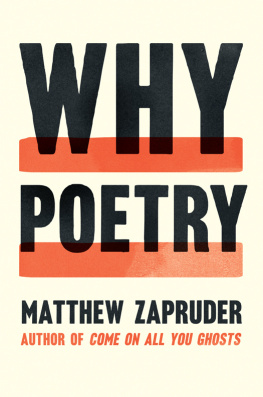Praise for
The D HARMA of POETRY
John Brehm is a wonderful teacher. In these lucid essays about poems and poets, and in the carefully crafted exercises that follow, he takes us on a contemplative stroll through the centuries and deeply into our own minds. Poetry and spiritual practice have always had a lot to do with one another; in The Dharma of Poetry we see exactly why and how. Norman Fischer, poet and Zen Buddhist priest, author of The World Could Be Otherwise
A wonderfully encouraging book. There is a beautiful alchemy in the way Brehm turns poems into practice. He shows us the ways poems are by their nature moments of liberating attentiveness. And in his clear and welcoming voice, Brehm reveals how that liberation can infuse our everyday lives. How it can transform not just us, but also this world in ecological crisis. David Hinton, author of China Root and Hunger Mountain
Here are ten elegant teachings on how to live. Heather Sellers, author of You Dont Look Like Anyone I Know
PUBLISHERS
ACKNOWLEDGMENT
The publisher gratefully acknowledges the generous help of the Hershey Family Foundation in sponsoring the production of this book.
Wisdom Publications
199 Elm Street
Somerville, MA 02144 USA
wisdomexperience.org
2021 John Brehm
See Credits for further copyright information.
All rights reserved.
No part of this book may be reproduced in any form or by any means, electronic or mechanical, including photography, recording, or by any information storage and retrieval system or technologies now known or later developed, without permission in writing from the publisher.
Library of Congress Cataloging-in-Publication Data
Names: Brehm, John, 1955 author.
Title: The dharma of poetry: how poems can deepen your spiritual practice and open you to joy / John Brehm.
Description: First. | Somerville: Wisdom Publications, 2021. | Includes bibliographical references.
Identifiers: LCCN 2020028105 (print) | LCCN 2020028106 (ebook) | ISBN 9781614297208 (paperback) | ISBN 9781614297345 (ebook)
Subjects: LCSH: Poetry Religious aspects Buddhism. | Buddhism and literature. | Poetics.
Classification: LCC PN1077 .B57 2021 (print) | LCC PN1077 (ebook) | sDDC 808.1 dc23
LC record available at https://lccn.loc.gov/2020028105
LC ebook record available at https://lccn.loc.gov/2020028106
ISBN 978-1-61429-720-8 ebook ISBN 978-1-61429-734-5
24 23 22 21 20 5 4 3 2 1
Cover design by Jim Zaccaria. Interior design by Tim Holtz. Cover painting by Kevin Sloan.
Printed in the United States of America.
INTRODUCTION
This is a book about poetry as a source of wisdom. It argues not that poems are or should be didactic or prophetic or that poets be regarded as sages making grand pronouncements about the meaning of life but that poems embody and implicitly endorse ways of being in the world that anyone engaged in spiritual practice, or anyone wanting to live a more mindful life, might want to emulate.
Heres an example of what I mean, a haiku by the great Japanese poet, Kobyashi Issa (17631828), translated by Robert Hass.
Im going to roll over,
so please move,
cricket.
The poem, like many of Issas, is charming in its simplicity, its childlike innocence. Didnt we all once talk to animals, large and small? The poem is nothing more but also nothing less than a gentle warning and request spoken by a person to a cricket. The poet is not telling us how to live or arguing for the virtue of non-harming. Instead Issa demonstrates an attitude toward life and a way of behaving whose ethical dimension is plain to see. Even insects deserve our respect, the poem seems to say, deserve to live out their lives and not be harmed simply for being in our way. Its important also to note that the poem is not addressed to us but to the cricket. And what is the significance of that? What are we to make of a man speaking to an insect? It suggests a friendliness and care that Issa extends to all beings, even the most lowly among us. Indeed, the poem may be seen as a subtle subversion of the hierarchy which we humans impose, always to our own benefit, on the world around us. It implies that we are not separate from or more important than the creatures with whom we share this life, that we can and should address them as equals, and that we can be mindful of their well-being as we move through the world.
All this in just three lines, and without ever making a direct assertion about how one should live. Such is the power of poetry.
If poetry models certain kinds of outward behaviors, it also embodies and elicits certain kinds of awareness. Poems arise out of moments of heightened awareness, and as such they have the power to heighten our own awareness as we read them. For to truly enter a poem requires mindful attention, an alertness, curiosity, and open-hearted responsiveness that is very much like the awareness we cultivate in meditation. And if we can drop our usual way of engaging a poem worrying about what it means, getting stuck on lines or words we dont immediately understand and then feeling self-conscious or frustrated for not understanding; if we can instead simply notice and appreciate what the poem is doing, just as one brings bare attention to thoughts and sensations in meditation, then our experience of the poem can be quite rich and rewarding, even if we dont entirely get it. Of course Im speaking of poems of great power and depth, poems that feel lit from within, poems that somehow evoke what we already knew to be true without quite knowing how we knew.
The poems Ill be discussing all have this depth and power. Ive drawn all but two of them from The Poetry of Impermanence, Mindfulness, and Joy, and in many ways The Dharma of Poetry can be read as a companion to that collection. I conceived of this book while gathering poems for the anthology, as I began to see more clearly how the Dharma shines through so many of my favorite poems, even those by poets who were not Buddhists or spiritual in any conventional sense, though I would argue that writing poetry is by its nature a spiritual activity. I began to see that poems can play a role in the Dharma world that they have largely ceased to play in our literary culture: as sources of wisdom and insight, and as exemplary models of how we might think, feel, imagine, live.
In The Poetryof Impermanence, Mindfulness, and Joy I suggested that the poems in the collection could be seen as spiritual friends, companions on the path. Here, I would like to take that suggestion a step further to show how these poems can be seen not just as spiritual friends but as spiritual teachers, as powerful conduits for the Dharma. Poetry has always been deeply interwoven with Buddhist thought and practice, beginning with the oldest scriptures in the Pali Canon. We have the Dhammapada, a collection of the Buddhas sayings in verse, dating to the third century BCE; the Chan poets Li Po and Tu Fu in eighth century China; the songs of the Tibetan monk Milarepa, from the twelfth century; the great Japanese haiku poets Basho, Buson, and Issa, spanning the seventeenth, eighteenth, and nineteenth centuries; modern and contemporary American poets such as Kenneth Rexroth, Allen Ginsberg, Gary Snyder, and Jane Hirshfield; and scores of other poets influenced directly or indirectly by Buddhist thought. From the beginning, poetry has served as a vehicle for expressing the Dharma, and the Dharma has been a source of inspiration for poetry.
Poetry brings us into living contact with the Dharma, it shows how the Dharma flows through our human experience, as poets work with
Next page
